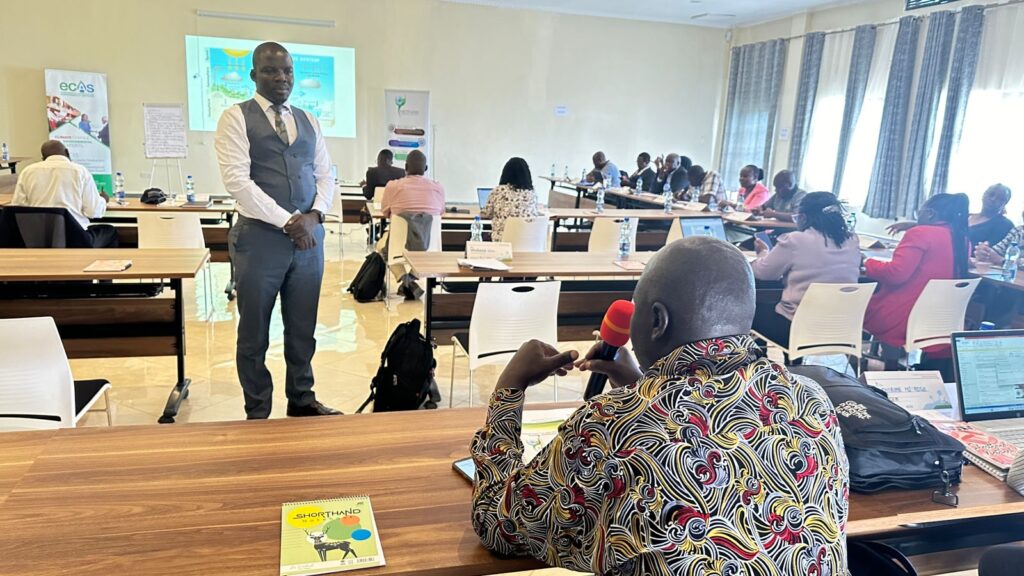
CONCEPT NOTE
INTERNATIONAL TRAINING ON INTEGRATED PLANNING FOR NATURE AND BIODIVERSITY-BASED SOLUTIONS TO CLIMATE CHANGE
COURSE BACKGROUND
As climate change accelerates, the need for nature-based solutions (NbS) and biodiversity conservation has become more urgent. Healthy ecosystems, such as forests, wetlands, and coastal habitats, play a crucial role in climate mitigation, adaptation, and resilience-building. However, many developments and climate adaptation strategies fail to fully integrate biodiversity conservation into planning processes.
This course, designed by the Environmental Capacities and Sustainability (ECAS) Institute, aims to bridge the gap between climate policy, biodiversity management, and sustainable development. It will equip participants with the tools, strategies, and frameworks needed to incorporate nature-based solutions (NbS) into climate adaptation and mitigation efforts. The course focuses on integrating ecosystem-based approaches into national and local climate action plans, ensuring that biodiversity is at the heart of sustainable development.
Through a combination of scientific insights, policy frameworks, and real-world case studies, participants will explore how nature-based strategies can enhance resilience, support livelihoods, and contribute to sustainable economic growth.
COURSE OBJECTIVES OF THE TRAINING
By the end of the course, participants will be able to:
- Understand the role of biodiversity and ecosystems in climate change mitigation and adaptation.
- Develop integrated planning frameworks that incorporate nature-based solutions (NbS).
- Assess the effectiveness of ecosystem-based approaches in reducing climate risks.
- Apply tools and methodologies for biodiversity-sensitive climate adaptation planning.
- Enhance policy integration of NbS into national climate strategies and development plans.
- Improve financing and investment strategies for nature-based climate action.
- Strengthen stakeholder engagement in biodiversity and ecosystem conservation.
- Promote sustainable land-use practices that balance conservation with economic development.
WHAT YOU WILL LEARN
Participants will gain knowledge and hands-on experience in:
- Principles of Nature-Based Solutions (NbS) for Climate Adaptation and Mitigation.
- Biodiversity and ecosystem services in climate risk reduction.
- Ecosystem-based adaptation (EbA) strategies for different landscapes.
- Tools and techniques for integrating NbS into climate action plans.
- GIS and remote sensing applications for ecosystem and biodiversity monitoring.
- Financing mechanisms and policy instruments for NbS.
- Multi-stakeholder approaches to biodiversity and climate resilience.
- Case studies on successful NbS implementation worldwide.
DURATION AND PROGRAM
TARGET PARTICIPANTS
This course is designed for climate policymakers, environmental planners, conservation practitioners, natural resource managers, urban planners, researchers, and development professionals involved in climate adaptation, biodiversity conservation, and sustainable land-use management.
It is also relevant for government agencies, international organizations, NGOs, private sector actors, and community leaders working to integrate nature-based solutions into climate and development strategies at national and local levels.
TRAINING MODULES
| No | Module | Details | |
| 1. | Introduction to Nature-Based Solutions (NbS) for Climate Resilience |
| |
| 2. | Biodiversity and Ecosystem Services in Climate Action |
| |
| 3. | Ecosystem-Based Adaptation (EbA) for Different Landscapes |
| |
| 4. | Tools and Methods for Integrating NbS into Climate Planning |
| |
5. | Financing and Investment Strategies for NbS |
| |
| 6. | Policy and Governance Frameworks for NbS Implementation |
| |
| 7. | Multi-Stakeholder Approaches to NbS Implementation |
| |
| 8. | Case Studies and Best Practices in Nature-Based Climate Solutions |
| |
TRAINING STYLE
This course employs a blended learning approach, combining expert-led lectures, interactive discussions, case study analysis, practical exercises, and group work. Participants will engage in hands-on GIS and remote sensing applications, policy simulations, and scenario-based planning exercises to develop actionable NbS strategies.
Additionally, real-world case studies, study tours (where possible), and knowledge-sharing sessions will provide participants with practical insights and networking opportunities. The training will also include peer-to-peer learning, problem-solving workshops, and policy dialogues to ensure that participants can apply nature-based solutions effectively in their professional contexts.
By the end of the course, participants will have the skills, tools, and strategic frameworks needed to integrate biodiversity and ecosystem-based solutions into climate and development planning, ensuring a sustainable, resilient future for communities and ecosystems alike.
GENERAL NOTES
- Training manuals and additional reference materials are provided to the participants.
- Upon successful completion of this course, participants will be issued with a certificate.
- We can also do this as a tailor-made course to meet organization-wide needs. Contact us to find out more: info@ecasiafrica.org.
- Payment should be sent to our bank account before the start of training and proof of payment sent to: info@ecasiafrica.org.
ABOUT ECAS INSTITUTE
The ECAS Institute designs and delivers independent and targeted training, research, and consulting services. Our work focusses on climate change and resilience building, carbon markets, renewable energy, nature-based solution, biodiversity conservation, agriculture and food systems, We are located in Nairobi Kenya and work across the African region. We have implemented training and research assignments in Kenya, Tanzania, Uganda, South Sudan, Somalia, Malawi, Rwanda, Congo, and South Africa. Globally, we have supported our partners from the UK, Denmark, Italy, Sweden, Germany, and USA.

